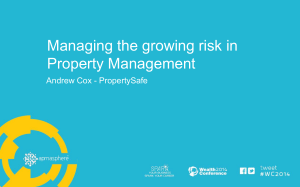Landlord`s Responsibilites on Health and Safety A Guide by
advertisement
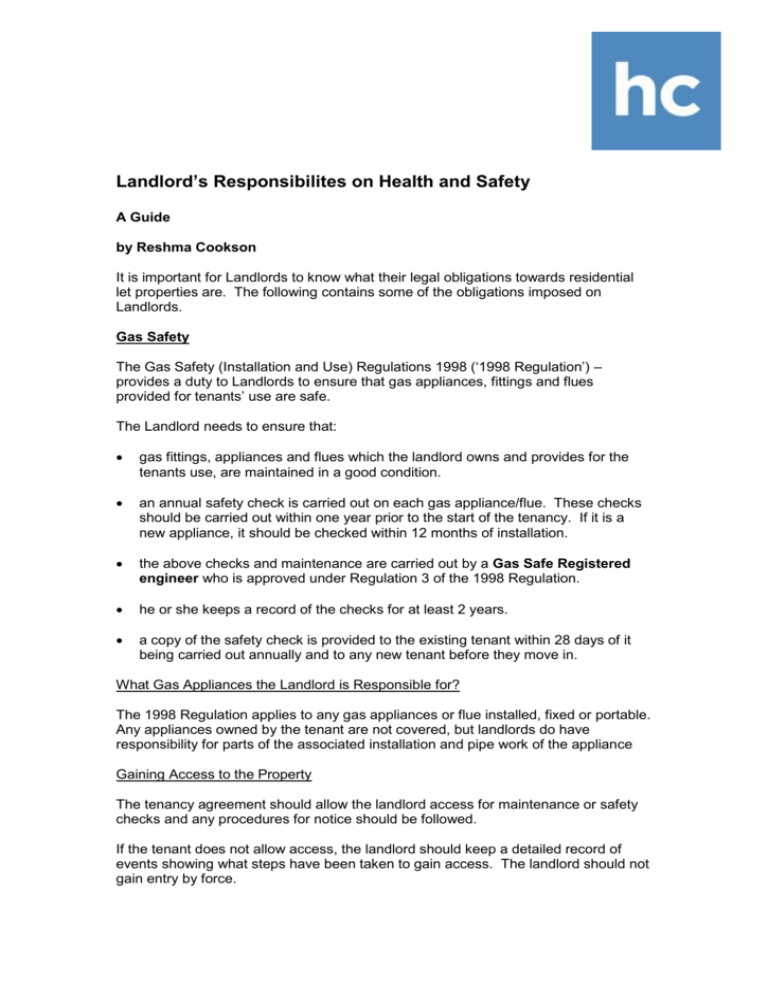
Landlord’s Responsibilites on Health and Safety A Guide by Reshma Cookson It is important for Landlords to know what their legal obligations towards residential let properties are. The following contains some of the obligations imposed on Landlords. Gas Safety The Gas Safety (Installation and Use) Regulations 1998 (‘1998 Regulation’) – provides a duty to Landlords to ensure that gas appliances, fittings and flues provided for tenants’ use are safe. The Landlord needs to ensure that: gas fittings, appliances and flues which the landlord owns and provides for the tenants use, are maintained in a good condition. an annual safety check is carried out on each gas appliance/flue. These checks should be carried out within one year prior to the start of the tenancy. If it is a new appliance, it should be checked within 12 months of installation. the above checks and maintenance are carried out by a Gas Safe Registered engineer who is approved under Regulation 3 of the 1998 Regulation. he or she keeps a record of the checks for at least 2 years. a copy of the safety check is provided to the existing tenant within 28 days of it being carried out annually and to any new tenant before they move in. What Gas Appliances the Landlord is Responsible for? The 1998 Regulation applies to any gas appliances or flue installed, fixed or portable. Any appliances owned by the tenant are not covered, but landlords do have responsibility for parts of the associated installation and pipe work of the appliance Gaining Access to the Property The tenancy agreement should allow the landlord access for maintenance or safety checks and any procedures for notice should be followed. If the tenant does not allow access, the landlord should keep a detailed record of events showing what steps have been taken to gain access. The landlord should not gain entry by force. What if the Appliance fails its Safety Check? If an appliance fails a safety check the landlord needs to ensure the defect is rectified before the appliance is used again and keep records of work done. It is an offence to use or allow the use of a gas appliance you know to be unsafe. Non Compliance Apart from the possibility of loss of life, the landlord risks being prosecuted which carries with it a maximum penalty of £20,000 / imprisonment for each offence. If the case is referred to the Crown Court the penalty could be an unlimited fine and possibly imprisonment. Electrical Appliances The landlord needs to ensure that any electrical installation and any electrical appliances supplied are safe to use. This needs to be done before the tenancy begins and the Landlord should also ensure the electrical installations are maintained in a safe condition throughout the tenancy. Regular inspection is therefore essential. The frequency of inspection may depend on the type of appliance, the age, use etc. The Electrical Equipment (Safety) Regulations 1994 requires the landlord to ensure that any appliances provided as part of the tenancy are safe when first supplied. Each time the tenancy is re-let, it is classed as supplying to that tenant for the first time. The landlord will need to ensure that a record of the checks are maintained. Any electrical work carried out should be done so by a competent person who is trained or registered with a Part P Self-Certification Scheme. Furniture and Furnishings The Landlord will need to ensure that any furniture and furnishings he supplies meets the fire resistance requirements in the Furniture and Furnishings (Fire) (Safety) Regulations 1988. Types of furniture that apply are: sofas and armchairs sofa beds and futons cushions and seat pads loose and stretch covers for furniture beds, headboards and mattresses nursery and children’s furniture furniture in a new caravan garden furniture that is used indoors There should be a symbol on your furniture to state that it is fire resistant. If the furnishings in the property are not fire resistant, they must be replaced otherwise the trading standards office may get involved. Other Legislation There are various other legislation and regulations that will impose obligations on landlords. One of which is the Landlord and Tenant 1985. The landlord is responsible for repairs to the structure and exterior of the dwelling, basins, sinks, baths and other sanitary installations and heating and hot water installations. There is also the Consumer Protection Act 1987 and the Housing Act 2004 amongst others. A helpful publication to use with regards to obligations contained in the Housing Act 2004 is by the Department for Communities and Local Government called, “Housing Health and Safety Rating System – Guidance for Landlords and Property Related Professionals”. This sets out guidance according to the Local Authority rating system. This publication does not cover all matters of repairing obligations. Landlords should ensure that they are fully aware of their obligations before letting out their property even if a letting agent is appointed. If you would like legal advice on your responsibilities as a landlord please call Reshma Cookson at Hunt & Coombs on 01733 882800 or email reshma.cookson@hcsolicitors.co.uk.
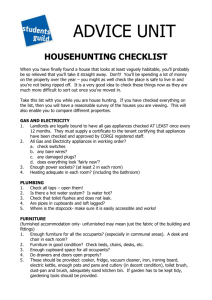
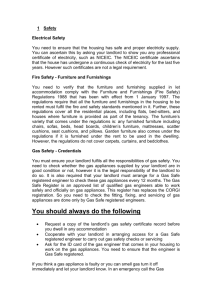
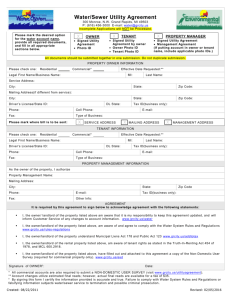
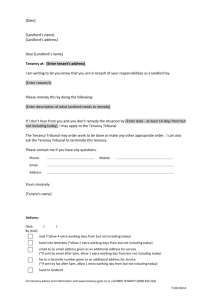

![[Date] [Name of Landlord I`m Applying to] [Landlord I`m Applying to](http://s3.studylib.net/store/data/006797608_2-3bf07d32e3f6a0a58c5d937b12404929-300x300.png)
